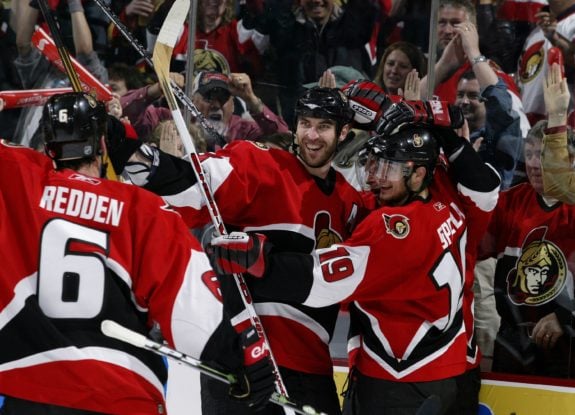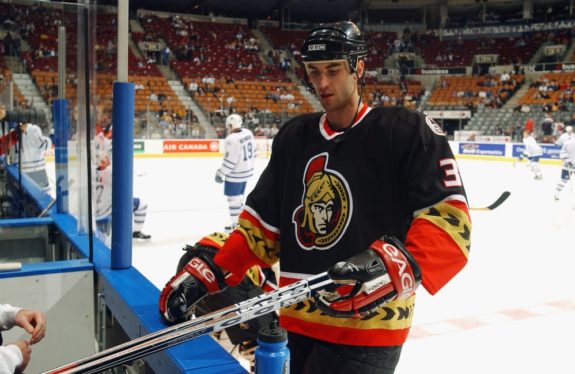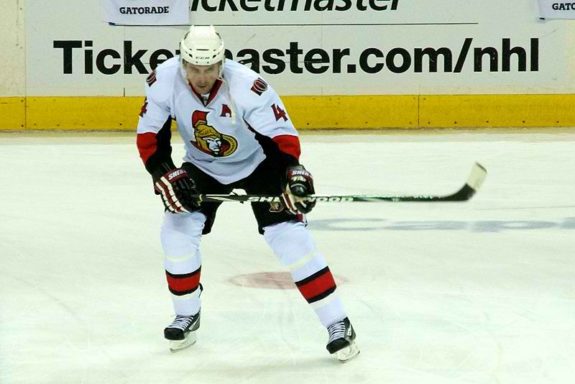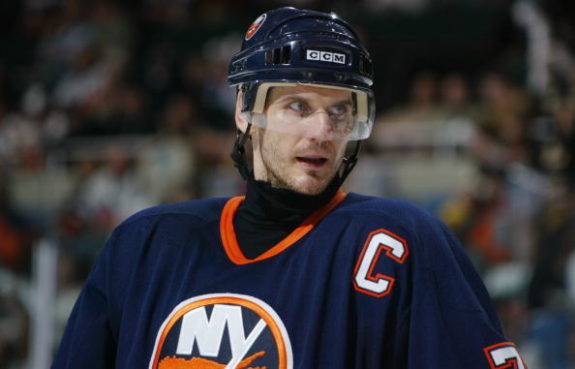There’s something special about a player who spends his entire career with one team. Whereas it used to be a common occurrence – think Mario Lemieux, Jean Beliveau, or Joe Sakic – the salary cap era has made the feat somewhat rarer. Now, franchise players often finish their careers in other markets. It’s led to the departure of Daniel Alfredsson from the Ottawa Senators, to Jarome Iginla getting traded from the Calgary Flames, or to Martin Brodeur making a brief appearance with the St. Louis Blues. Aging players with big contracts don’t have enough value for management to justify keeping them around.
That’s what makes Chris Phillips’ career so special in the modern hockey era. After being drafted first overall by the Ottawa Senators in 1996, he played 1179 games for the team in a career that spanned nearly two decades. Although not known for his offense, he ranks third in franchise history in points among defensemen with 288, as well as second in penalty minutes with 756.

There are few players who mean as much to their team as Phillips does to the Senators. Not only was he a talented player and reliable defensive defenseman, but he made a significant impact on the community, choosing to remain in the city after he retired in 2016. On Feb 18, 2020, the Senators honored their first franchise defenseman by raising his No. 4 to the rafters, only the third retired number by the organization along with Frank Finnigan’s No. 8 and Alfredsson’s No. 11.
Here’s a look back at what made Phillips one of the Senators’ best.
A Strong Character
One of the first things anyone says about Phillips is about his character. A fifth-overall selection by the WHL’s Prince Albert Raiders in 1993, it was expected he would be a dominant force for the team. He didn’t disappoint, scoring 40 points in 61 games in 1995-96, helping the Raiders return to the Conference Final for the second season in a row. He also made the 1996 Canadian World Junior team as the only undrafted player on the roster, helping them claim their fourth gold medal in a row.
However, what was more impressive was that Phillips did all this as a rookie in the WHL. Whereas most top prospects join the league at 16 years old, he decided to play in the Alberta Junior Hockey League (AJHL) with the Fort McMurray Oil Barons. The decision was influenced by his desire to remain close to his family, as his parents had recently suffered two serious health problems: his mother contracted a virus that attacked her spinal cord, leaving her in a wheelchair, and his father had gone blind due to his struggle with diabetes.
It was a strong indication of Phillips’ character which endeared him to the NHL ahead of the 1996 Entry Draft. The prospect pool that season was arguably one of the weakest in recent memory, but there was still some excitement as to who would be taken first. Phillips was the recipient of the Canadian Hockey League’s (CHL) Top Prospect Award, the WHL’s Rookie of the Year, and a member of the CHL’s All-Rookie Team, but another defender playing in Europe, Andrei Zyuzin, had a better offensive upside than his Canadian counterpart. Alex Volchkov, playing for the Barrie Colts, was also highly regarded but there were concerns about his character.
In the end, character won out. The Senators, armed with their third first-overall selection in four years, grabbed the all-around defenseman from Fort McMurray, Alberta. It was a wise move by Ottawa; Zyuzin never scored more than 21 points in a season over a 10-year career, and Volchkov played all of three games for the Washington Capitals before his poor attitude forced him out of the NHL and back to his Russian homeland.
Phillips, however, grew into one of the most respected leaders for the Senators. In 2006-07, an ‘A’ was officially stitched onto his jersey. He wore that letter proudly for 10 seasons, the longest any Senator has served as alternate captain. He expressed a desire to be named captain after Alfredsson left in 2013, and again when Jason Spezza left in 2014, saying, “I’m capable and deserving and I want that responsibility,” (from ‘Chris Phillips wants the responsibility that would come with being Senators’ captain’, Ottawa Citizen – Sep 9, 2014). However, it was given to Erik Karlsson, which some fans still recall with bitterness.
Throughout his career, he was active in the community of Ottawa-Gatineau, helping out several charities and children’s hospitals. After he retired, he continued to work for the Senators as an ambassador and runs hockey camps. He and his wife Erin also held a fundraiser in Ottawa to raise relief support for the Fort McMurray wildfires. For their charitable efforts, they were awarded the Order of Ottawa in 2016. It’s fair to say that no one worked harder or enjoyed what he did more than Phillips, on or off the ice.
A Powerful Shutdown Defender
There are few players like Phillips who solidified the Senators’ blue line. When he arrived in Ottawa in 1997-98 as a 19-year-old, the defense was in bad shape. The biggest star was Wade Redden, who had posted a 30-point rookie season the season before but still had defensive shortcomings, registering a plus-one in the same season. The rest of the team wasn’t much better; the highest plus/minus mark belonged to veteran Frantisek Musil with plus-six. Yet the team had talent on offense and managed to make the postseason for the first time in franchise history.

With Phillips, however, the team’s defense corps drastically improved. Redden’s plus/minus increased by 16 points and the Senators decreased the number of goals allowed by over 30, setting a team record for the least number of goals allowed over a full season. The team also won 34 games, finishing above 0.500 for the first time, and recorded 83 points, both team records. As for Phillips, he scored five goals and 16 points, earning some mild consideration for the Calder Trophy, and ended the season with a plus-two over 72 games.
Related: 2005-06 Ottawa Senators: What Could Have Been
The Senators finished eighth in the Eastern Conference, forcing them to take on the top-ranked New Jersey Devils in the first round, but after six games, it was Ottawa who was on top. The offense was driven by Alfredsson and Alexei Yashin, who combined for six goals, including a hat-trick by Alfredsson in Game 4. But Phillips was always there, playing in every game – just one of fourteen players to do so – and registered two assists despite being barely 20 years old. Although they fell to the Washington Capitals in the second round, it was an incredible season.
Over the next four seasons, Phillips struggled with injuries, causing him to miss 93 games, including over half of the 1998-99 season. Still, he chipped in when he could, helping the team return to the playoffs each season, although they advanced to the second round just once over that time. In 2001-02, he joined forces with recent acquisition Zdeno Chara to form one of the most effective shutdown pairs in the NHL.
The following season, with Phillips missing just four games and healthier than he had been in years, the tandem became even deadlier, and the Senators set franchise records with 52 wins, 113 points and 182 goals allowed. They cruised to first in the Eastern Conference, and in the playoffs, they continued to surge, defeating the New York Islanders in five games and the Philadelphia Flyers in six, advancing to the Conference Final for the first time. The Devils took the series in seven games and went on to win the Stanley Cup, but without Phillips, it’s unlikely the Senators would have been there in the first place.

Phillips’ best season came four years later in 2006-07. For just the second time in his nine seasons, he was able to play all 82 games, finishing with eight goals and 26 points, both career bests. Chara was no longer with the team, having signed with the Boston Bruins in the offseason so, Phillips partnered with Anton Volchenkov and created an even deadlier duo, Phillips was a plus-36 while his linemate posted a plus-37. Chara, on the other hand, sunk to a minus-21.
Related: Chris Phillips – The Sens’ Big Rig
Although the Senators finished a touch below their previous season record, from 113 points to 105 points, everything came together in the playoffs. In round one, they held the Pittsburgh Penguins, led by Sidney Crosby and Evgeni Malkin, to just one win. They did the same to the Devils in the second round, and the Buffalo Sabres in the Conference Final. All of a sudden, the Senators were facing off against the Anaheim Ducks in the Stanley Cup Final, losing only three games along the way.

It was the closest Phillips ever got to the Cup in his long career, as the Senators lost the series in five games. In 20 seasons, he was never selected for an All-Star team or won any individual awards, yet that was the way he played, always putting the team first and slipping under the radar. His physicality and consistency earned him the nickname ‘Big Rig’, which he accepted with pride, eventually naming a microbrewery in Ottawa after it. Despite his lack of accolades, he was a three-time member of the Canadian World Championship team, winning a silver medal in 2005 and 2009.
A Clutch Performer
Former coach and general manager Bryan Murray reportedly joked that no one loved scoring goals more than Phillips. Although he didn’t score a lot of them, he often scored at precisely the right time and in big ways. He was occasionally used as a forward early in his career because of his ability to make crucial plays. The Senators could see that ability in the first game of the 1998-99 season, when he played an incredible 28:18 against the Colorado Avalanche and netted two goals to lead the team to a 4-3 victory.
Four seasons later, it was Phillips who propelled the Senators to Game 7 against the Devils in the Eastern Conference Final. With the game tied at one and the Devils leading the series, the defensive defenseman found himself in the right position to bang home the overtime winner. You could feel his excitement as he jumped around the ice. “Since you’re four or five-years-old you dream about scoring goals in overtime. In an elimination game, to get us to a Game 7, it’s just an unbelievable feeling,” (from ‘CHRIS PHILLIPS: The top career moments of an all-time NHL great’, Ottawa Sun – Feb 17 2020).
Nine years after that, Phillips was playing in his 1000th game as a Senator. Already an impressive accomplishment – only four other players from the 1996 Draft reached that mark – he made the night even more special by scoring two goals against the Nashville Predators, one of which was the game-winner. “This is unbelievable,” Phillips said. “The whole hype around it was fun and exciting to be in my 1,000th game and to top it off with a couple goals and one ended up being a game winner? You can’t write that stuff.”
Over his career, Phillips only scored 71 goals, but he made sure that they counted. He could always be relied on to provide solid defense and chip in offensively when most needed. His 13 playoff points rank 21st all-time for the Senators, and his 103 playoff games rank second. However, his impact was always more than anything that could be recorded on a score sheet.
His Longevity
When Phillips arrived in Ottawa in 1997-98, he was just one of the Senators’ many high-end draft picks. The team had Yashin (second in 1992), Alexandre Daigle (first in 1993), Radek Bonk (third in 1994), and Redden (Islanders’ second in 1995). Marian Hossa, taken 12th in 1997, also made some brief appearances that season showcasing his incredible potential before being returned to junior. With Phillips, the group was expected to form the core of the future and lead the Senators out from the bottom of the standings.
Related: Radek Bonk, the Senators’ Forgotten Star
However, by the time the Senators reached that peak in 2007, only Phillips and Redden remained. Daigle was shipped to the Flyers in 1998 for Vaclav Prospal, another promising youngster who was traded away for a conditional pick three seasons later. Yashin, after a lengthy contract dispute, was traded to the Islanders for the second-overall pick that would be used on Spezza, and Chara, who left in 2006. Bonk was traded in 2004 to the Montreal Canadiens and Hossa was sent to the Atlanta Thrashers in 2005 for Dany Heatley.

As the Senators began to regress, the next wave of stars also began to move on. Redden departed as a free agent to the New York Rangers in 2008, while Heatley was traded to the San Jose Sharks before the 2009-10 season. Fan favourite Mike Fisher, a second-round pick in 1998, was traded at the 2010-11 Trade Deadline. Not even Alfredsson chose to stick around, leaving for the Detroit Red Wings in 2013, and Spezza left the following season in a trade to the Dallas Stars. Yet Phillips remained, providing leadership and mentoring the next generation of defensemen in Karlsson, Cody Ceci and Mark Borowiecki.
Phillips’ career ended on Feb. 15, 2015 against the the Washington Capitals. That night, the Senators honored their long-time defenseman with a jersey displaying the number of games he had played – 1179. It was a franchise record and one game more than Alfredsson, the previous record holder. Although he didn’t know it at the time, Phillips didn’t play another game, as he struggled with back injuries that kept him off the ice. Over a year later, on May 26, 2016, he officially announced his retirement, joining the Senators’ front office.
“When I came into the league, I thought that if I could play 10 years that would be a long career. To be able to stick around as long as I did, I didn’t think that was possible. Being a defensive defenceman, what my role was what I was proud of. Lots of nights I had various injuries and when I look back, it’s almost stupid the things I did just to play the game. There was a large number of games I played when I wasn’t 100 percent but I went out to battle and did the best I could to try to help the team,”
Chris Phillips (from ‘CHRIS PHILLIPS: The top career moments of an all-time NHL great’, Ottawa Sun – Feb 17 2020).
Legacy
Phillips was never the most talented player on the ice, nor the biggest or fastest. His name is not any trophy nor does he have a Cup ring. But he was one of the hardest-working, most reliable, and one of the most genuinely good people in hockey. He kept a low profile, preferring to let his work do the talking, and the city of Ottawa is a better place because of it.
To see his number hang from the rafters is a deserving honour, as no one will be able to embody the number ‘4’ in the way Phillips did. He is a Senators legend.
Get the latest Ottawa Senators news, rumors, commentary and analysis